“The Monk Who Sold His Ferrari” by Robin Sharma is a self-help book that tells the story of Julian Mantle, a successful lawyer who has a life-altering experience. After a heart attack, Julian embarks on a spiritual journey to find true happiness and fulfillment. The book blends fictional storytelling with practical life lessons, focusing on personal development, balance, and the pursuit of a meaningful life.
Chapter 1. The Wake-Up Call

Julian Mantle, a wealthy and successful lawyer, suffers a heart attack in the middle of a courtroom. This event serves as a wake-up call, making him realize that his high-pressure, materialistic lifestyle is taking a toll on his health and happiness. He decides to sell all his possessions, including his Ferrari, and embarks on a journey to India in search of a more meaningful life.
Sometimes, life gives us wake-up calls that make us rethink our priorities. Julian’s heart attack symbolizes how the relentless pursuit of success and wealth can lead to burnout and emptiness. This lesson encourages us to reflect on what truly matters in life – not just material success, but also health, happiness, and inner peace.
Chapter 2. The Journey to Sivana

Julian travels to the Himalayas, where he meets a group of sages called the Sages of Sivana. These wise monks live a life of simplicity, peace, and purpose. They teach Julian the ancient wisdom of how to live a fulfilling life, which he then shares with others.
Julian’s journey represents the search for wisdom and self-discovery. The Sages of Sivana symbolize the inner wisdom that we all have access to, but often overlook. This lesson teaches us that true fulfillment comes from within, and sometimes we need to step away from the chaos of life to find it.
Chapter 3. The Garden Metaphor
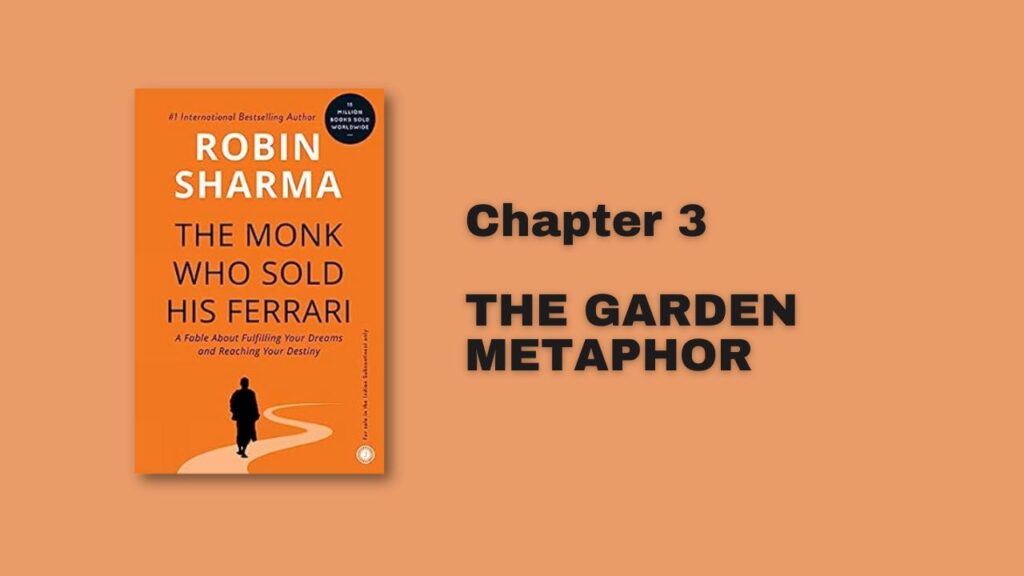
The Sages of Sivana use the metaphor of a garden to explain the mind. They tell Julian that the mind is like a garden, and if you don’t tend to it, weeds will grow. By cultivating positive thoughts and removing negative ones, you can create a beautiful and peaceful mind.
Just like a garden needs regular care, our minds need attention too. If we allow negative thoughts, fears, and worries to take over, they will grow like weeds and choke out the positive aspects of our lives. This lesson encourages us to be mindful of our thoughts and focus on nurturing positivity.
Chapter 4. The Power of Purpose

One of the key teachings Julian learns is the importance of having a clear purpose in life. The sages teach him that having a sense of purpose gives life meaning and direction. Without it, people can feel lost and unfulfilled.
Imagine your purpose as a guiding star that helps you navigate through life. When you know what you’re aiming for, it’s easier to make decisions and stay motivated. This lesson highlights the importance of finding and pursuing your life’s purpose, whether it’s personal growth, helping others, or achieving specific goals.
Chapter 5. The Ritual of Solitude
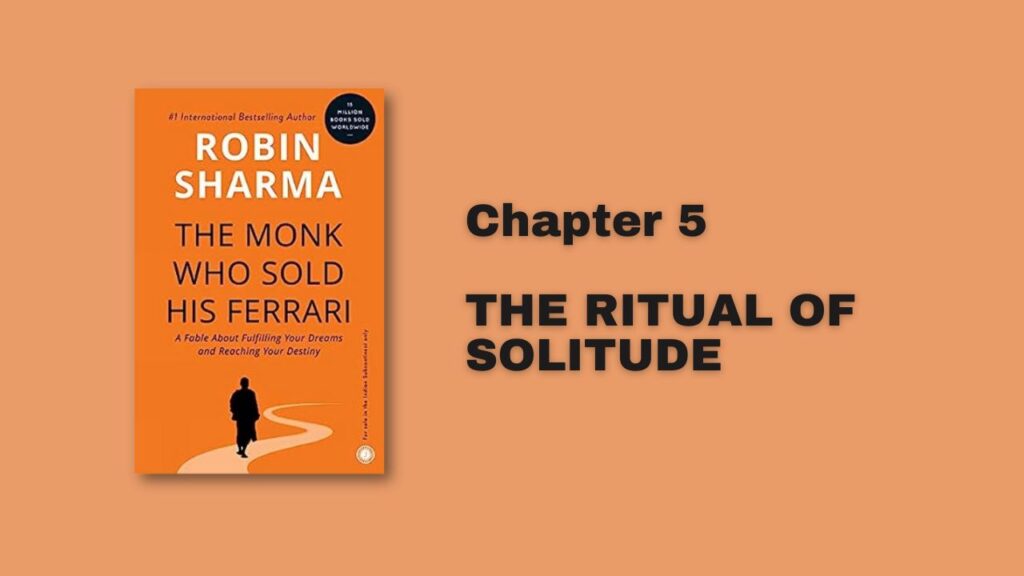
The Sages of Sivana emphasize the importance of spending time in solitude. They practice daily meditation and quiet reflection to calm their minds and connect with their inner selves. Julian learns that solitude helps him gain clarity and inner peace.
In our busy lives, it’s easy to get caught up in distractions and stress. Taking time for solitude – whether through meditation, quiet walks, or simply sitting in silence – allows us to recharge and reflect on our thoughts. This lesson teaches us that solitude is essential for mental and emotional well-being.
Chapter 6. The Power of Kaizen (Continuous Improvement)
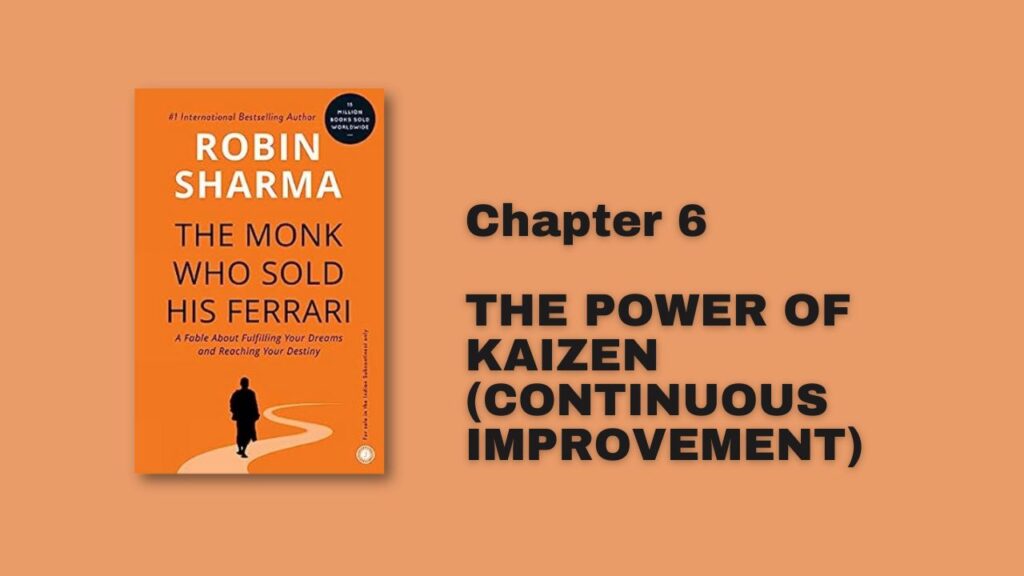
The sages teach Julian about the Japanese philosophy of Kaizen, which means continuous improvement. They encourage him to make small, consistent improvements in all areas of his life, from health and fitness to relationships and personal growth.
Kaizen is the idea that small, gradual changes can lead to significant improvements over time. Instead of trying to make big changes all at once, focus on making tiny adjustments every day. This lesson encourages us to embrace the journey of self-improvement and celebrate small wins along the way.
Chapter 7. The Importance of Discipline
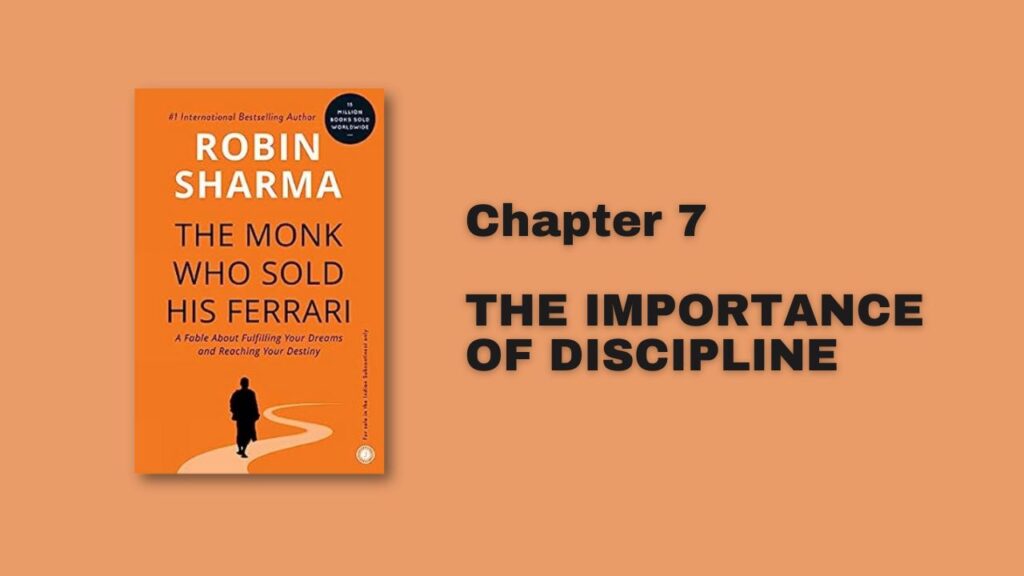
Discipline is another key lesson Julian learns. The sages teach him that self-discipline is the foundation of a fulfilling life. By developing discipline, Julian is able to stick to his goals, maintain healthy habits, and resist temptations.
Discipline is like a muscle – the more you use it, the stronger it gets. Whether it’s sticking to a workout routine, resisting unhealthy foods, or staying focused on a project, discipline helps you stay on track. This lesson teaches us that self-discipline is essential for achieving success and maintaining a balanced life.
Chapter 8. The Ritual of Early Awakening
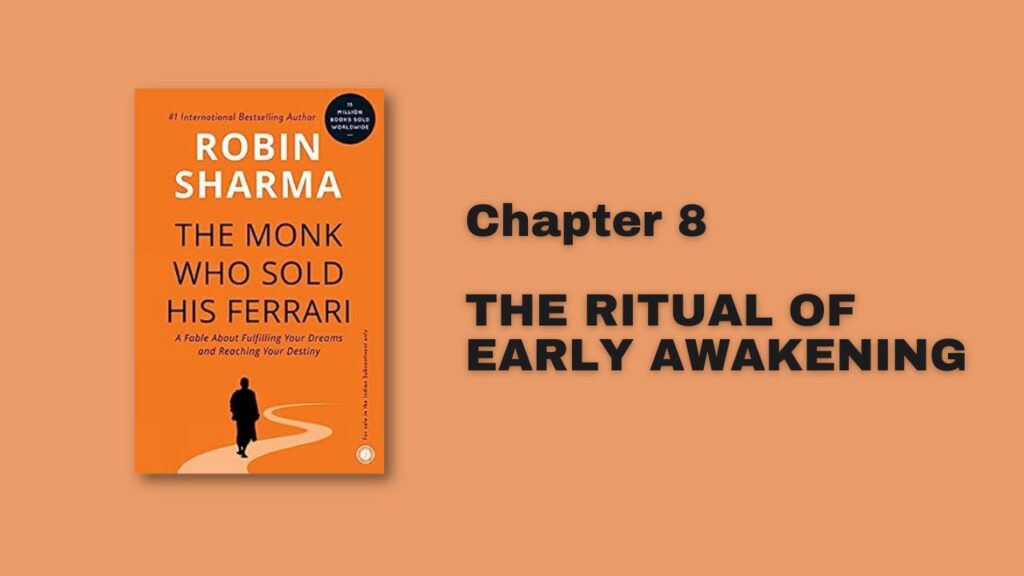
Julian learns the benefits of waking up early. The sages practice waking up before sunrise to make the most of the quiet morning hours for meditation, reflection, and planning their day. This habit helps them start their day with focus and intention.
Waking up early gives you a head start on the day. It allows you to set the tone for the day, plan your activities, and approach your tasks with a calm and focused mind. This lesson encourages us to adopt the habit of early rising to create a more productive and peaceful daily routine.
Chapter 9. The Ritual of Nourishment
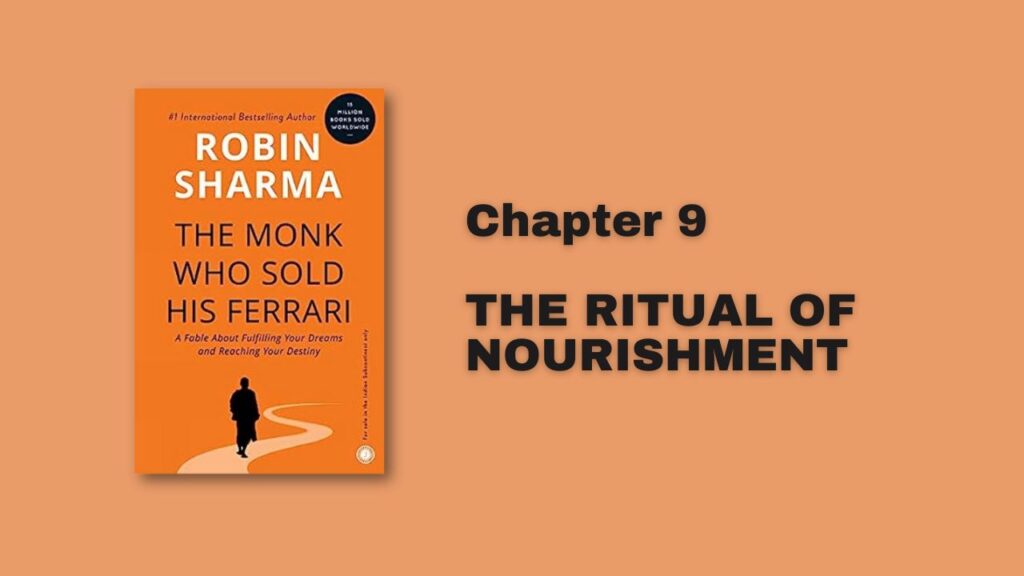
The sages emphasize the importance of taking care of the body through proper nourishment. They teach Julian to eat healthy, natural foods that fuel the body and mind. They believe that what you eat affects not just your physical health, but also your mental and spiritual well-being.
Your body is like a vehicle that carries you through life, and what you put into it affects how well it functions. By choosing healthy, nutritious foods, you support your body’s ability to perform at its best. This lesson teaches us to be mindful of what we eat and to nourish our bodies with care.
Chapter 10. The Ritual of Abundant Knowledge
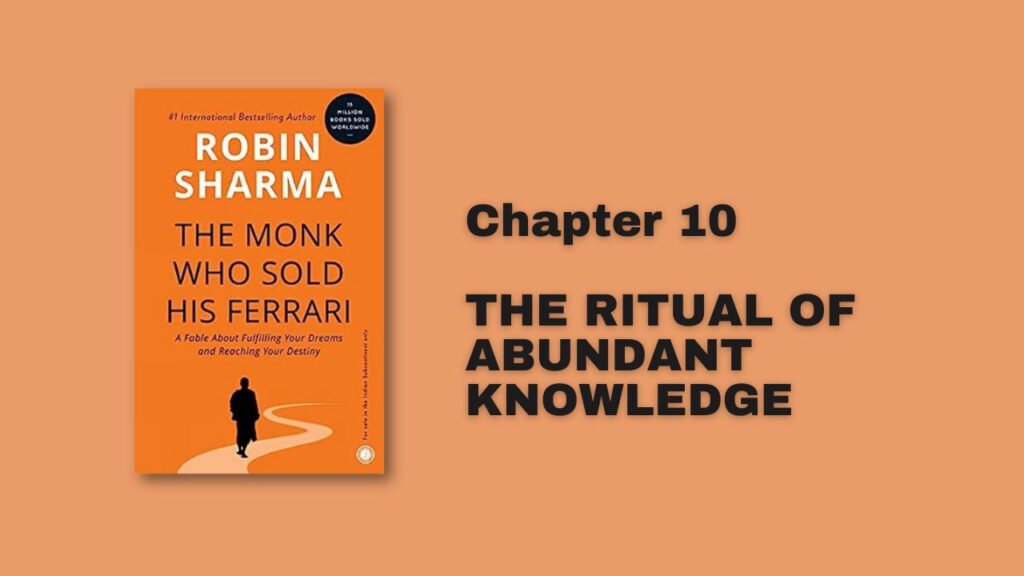
The Sages of Sivana are lifelong learners. They believe in the power of continuous learning and encourage Julian to keep expanding his knowledge and skills. They see learning as a way to grow and improve every day.
Knowledge is like fuel for your mind. The more you learn, the more you grow. This lesson teaches us to be curious, to seek out new information, and to challenge ourselves to keep learning throughout life. Whether it’s reading, taking courses, or trying new experiences, learning keeps us sharp and open to new possibilities.
Chapter 11. The Ritual of Personal Reflection
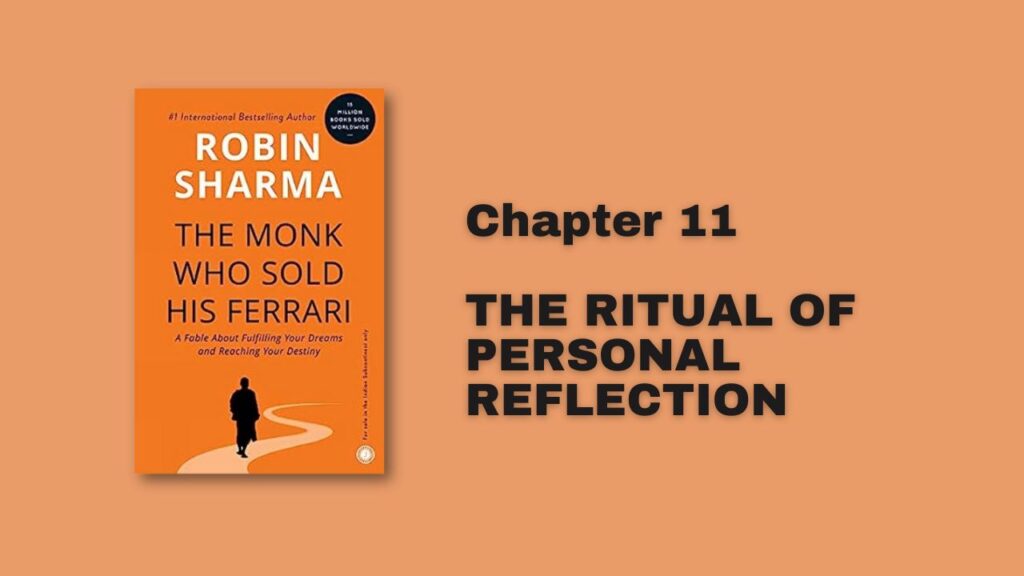
The sages practice regular personal reflection to evaluate their actions, thoughts, and progress. They encourage Julian to reflect on his day every evening to learn from his experiences and make adjustments for the future.
Reflection is like looking in a mirror for your mind. By taking time to review your day, you can see what went well, what didn’t, and how you can improve. This lesson teaches us that regular reflection helps us grow and make better decisions moving forward.
Chapter 12. The Ritual of Giving
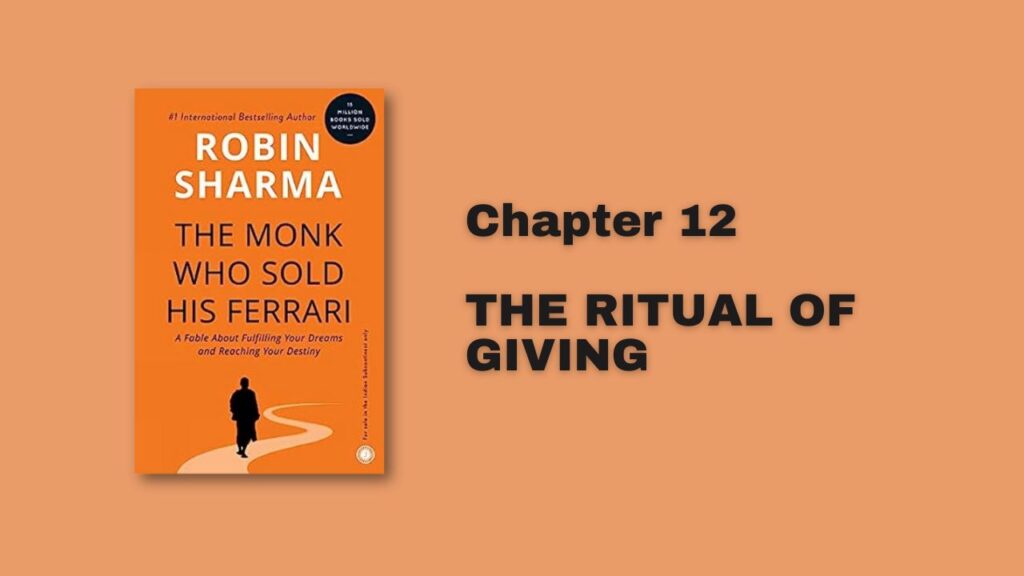
One of the most important lessons Julian learns is the joy of giving. The sages believe that true happiness comes from serving others and sharing your blessings. They encourage Julian to give freely and generously, without expecting anything in return.
Giving is like planting seeds of happiness. When you help others, you not only make their lives better, but you also create a sense of fulfillment and joy within yourself. This lesson teaches us that generosity and kindness are key components of a meaningful life.
Conclusion :

“The Monk Who Sold His Ferrari” is a powerful guide to living a balanced and fulfilling life. Through Julian’s journey, we learn that true success isn’t about wealth or status, but about inner peace, purpose, and personal growth. The lessons in the book encourage us to cultivate our minds, take care of our bodies, and live with intention, discipline, and generosity.
Read more books summary like this
Think Like a Monk
By Jay Shetty
Unfu*k Yourself
By Gary John Bishop
22 Immutable Laws of Marketing
By AL Ries & Jack Trout
The Subtle Art of Not Giving a Fu*k
By Mark Manson
The Secret
By Rhonda Byrne
Think Like an Entrepreneur
By Beverly E. Jones
The 48 Laws of Power
By Robert Greene
How They Succeeded
By Orison Swett Marden
Thinking Fast and Slow
By Daniel Kahneman










